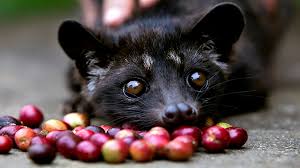Ah - you are correct. I missed that. Good news - things are progressing!
1 Like
Yes. It’s great. I should have posted. It’s a great first step.
JuanDaw
#26
How about coffee? People are already enjoying cat poop coffee (Civet coffee). Remember Morgan Freeman and Jack Nicholson?
1 Like
An interesting DIY Fecal Microbiota Transplants for Anti-Aging and Biohacking page: (be sure to read the comments at the bottom, there are many critical comments on the article).
I wouldn’t do it - but interesting to follow the science as it develops.
4 Likes
约瑟夫
#28
Is very expe$$ive;
Another day at work for the civet.

1 Like
Very interesting update on an FMT study. Not only did an FMT restore microbiome diversity in an older subject, but that restoration appeared lasting at the 6-month mark
In summary, while the flagellin intervention greatly reduced microbial diversity in the process of greatly improving other metrics, that diversity was restored by fecal microbiota transplant from a young individual. That restoration appears lasting as of the six month mark. The transplant produced small gains in some of the other metrics assessed by Viome, though not to the same degree as the flagellin immunization. That may well be because much of the potential scope for improvement was already achieved. Interestingly, neither intervention did much for Metabolic Fitness.
3 Likes
This also seems like a positive step in the right direction. I’d be curious to know the ages of the donors that Seres is sourcing.
4 Likes
It seems to me the donor that you can trust the most is yourself (assuming you made the donation as a healthy baby and hadn’t yet received any antibiotics).
There is already a sizable business for cord blood and placenta storage. Maybe the cord blood companies can add infant fecal matter collection (and storage) to their list of offered services?
3 Likes
I think this is true, but that’s years and years away. The next best thing might be familial transplants. Although, I think gut microbiomes are conserved via the mother.
2 Likes
Bicep
#33
Surprised it worked so well on mice. I guess we’re all pretty similar under the fur.
2 Likes
Vida
#34
Does anyone know offhand where OpenBiome sources its samples from? Haven’t looked it up yet. I hope its not like plasma donation which draws those desperate for cash.
Update: “ 1. Donor screening and stool donation: A donor who has passed screening for potential health risks provides a stool sample.
2. Processing: The stool sample is mixed with a buffer to help bacteria survive being frozen. The resulting mixture is filtered to remove fiber and solid particles that may clog the machinery used to administer the investigational FMT preparation.”
Havent clicked on the links yet for interested donors- to assess age, health screening etc
Cdiff in one form or another) continues to be the only approved way to get FMT in the US (at least through OpenBiome), outside of a clinical trial.
Would be interested to hear the “horror stories” mentioned of those who know of catastrophc outcomes
Another update: looked up clinical trials for FMT. The majority are in countries far from US- china, ukraine, denmark, france. In the US , there still an overepresentation of c-diff. Many have a 50 percent chsnce if control group/- autologous. So you getvto have a colonoscopy and may just get back your own wortless bacterial soup
Next up thennis lookijg at a DIY approach
I wonder if there would be a tariff inmposed on Chinese poop
1 Like
Does anyone have DIY instructions on proper collection and storage of fecal matter (for possible familial use in the future)?
This paper seems a little overwhelming. Any idea of the approximate costs involved? Specifically what type of homogenizer is needed? Why does the temp need to reach -80C? What happens if the sample is frozen at a lower temp?
Processing
• Sterile-filtered diluent consisting of 12.5% glycerol in normal saline buffer (0.90%
w/v sodium chloride in water)
• 300-micron filter bags
• Sterile, disposable spatulas
• Homogenizer
• Sterile serological pipettes
• FMT preparation bottles
Storage
• Labels and bar codes
• Temperature controlled, -80 degrees Celsius freezer
• Electronic database and record of FMT preparations’ location